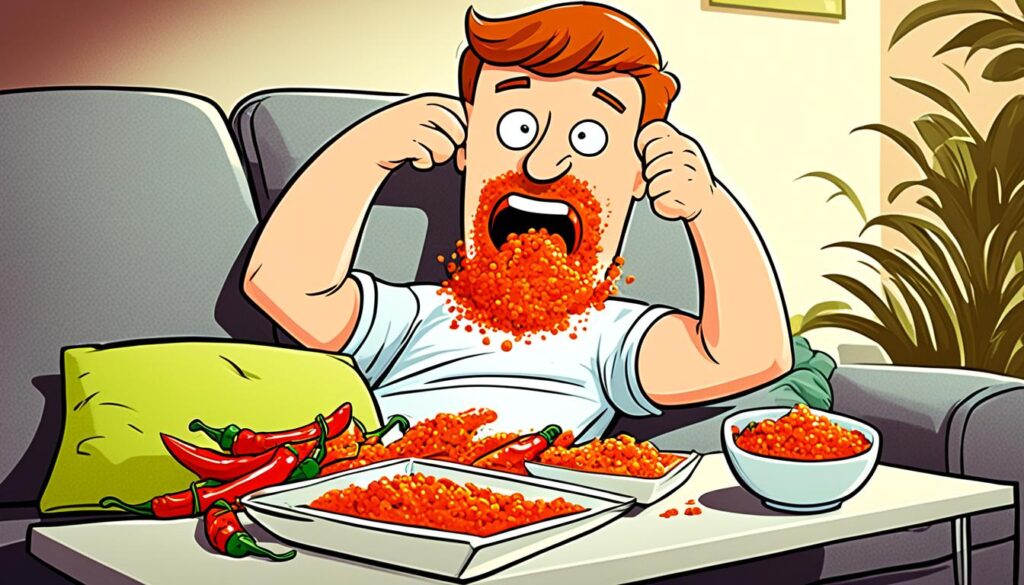Gastroesophageal reflux disease, known as GERD, affects many people. One in three in the United States suffers from its symptoms each week. GERD happens when stomach acid goes back up into the esophagus. This is because the valve between the stomach and esophagus doesn’t work as it should. The acid reflux can cause the esophagus to become irritated or inflamed.
Table of Contents
ToggleHeartburn is a common sign of GERD. But, it also shows up as regurgitation, chest pain, or lots of burping. Other signs can be nausea, a constant cough, trouble swallowing, and even vomiting. By knowing and avoiding what triggers GERD, you can manage the condition better.
Understanding GERD and Its Symptoms
GERD stands for gastroesophageal reflux disease. It’s a long-lasting digestive issue. Stomach acid goes back into the esophagus, causing trouble. This backwash can hurt the esophagus’s lining and lead to many problems.
What is GERD?
GERD Gastroesophageal Reflux Disease makes stomach acid go back into the esophagus often. A weak or wounded esophageal sphincter can be the cause. This sickness can irritate the esophagus, cause inflammation, and other severe problems over time.
Common Symptoms of GERD
The top sign of GERD is heartburn. It feels like a burn in the chest. This pain can get worse after eating, during the night, or when you lie down. Other signs include regurgitation, chest pain, lots of burps, sickness, a cough that won’t go away, a sore throat, trouble talking, trouble swallowing, and throwing up.
GERD Trigger #1: What You Eat
Many types of foods can start or make GERD worse. But, they don’t all work the same. Citrus fruits, tomatoes, coffee, and soda make your stomach more acidic. This makes acid reflux more likely. Foods like chocolate, peppermint, and alcohol can relax the esophageal sphincter. This allows stomach acid to return to the esophagus.
Acidic Foods and Beverages
Foods and drinks like citrus fruits, tomatoes, coffee, and soda can make GERD worse. They make your stomach more acidic, which sends stomach contents back into the esophagus.
Fatty and Fried Foods
Eating foods high in fats and fried foods can cause your stomach to produce more acid. This makes GERD happen more often. People with GERD should eat these foods less to feel better.
Spicy Foods and Condiments
Spicy foods like onions, garlic, and certain spices can also cause GERD. They irritate the esophagus and increase stomach acid. Not eating these foods might lessen how often GERD occurs.
Caffeine and Alcohol
Caffeine and alcohol can make your esophageal sphincter relax. This lets stomach acid return to your esophagus. If you have GERD, it’s best to drink less of these.
Discovering and avoiding foods that trigger your GERD is crucial. It helps manage symptoms and prevents serious problems. Reintroducing foods slowly lets you figure out safe options, avoiding GERD.

GERD Trigger #2: How Much You Eat
Eating a lot can cause GERD too. Big meals, especially late at night, put too much stress on the stomach. This can lead to acid going back up your throat. It’s better to eat smaller meals during the day. This way, your stomach doesn’t get too full. So, you won’t feel the effects of gerd symptoms after eating.
Smaller meals are easier on your body. They help your stomach work better. This is key to keep effects of how to avoid gerd at bay. Changing to smaller, more frequent meals can really help with GERD.
GERD Trigger #3: When You Eat
Eating too close to bedtime can make GERD symptoms worse. When you lie down, it’s easier for stomach contents to flow back up. Experts say you should wait 2-3 hours after your last meal before going to bed. This time helps your body digest the food.
Eating Before Bedtime
Eating right before bed is a big trigger for GERD. When you lie down soon after a meal, acid can move from your stomach to your esophagus. This can cause heartburn. To help with GERD, eat your last meal of the day 2-3 hours before you sleep.
Exercising on a Full Stomach
Working out after eating a lot can make GERD symptoms worse. When you do activities that make you bend or jump, it might lead to acid moving up your esophagus. To avoid this, wait 2-3 hours after a meal before doing intense exercises. Strenuous activities like running and some yoga poses may not be good for those with GERD.
Lifestyle Factors Aggravating GERD
Certain lifestyle factors can make [gerd risk factors] worse. It’s important to stay at a healthy weight and make smart lifestyle choices. These steps are key in handling gerd and obesity and gerd and smoking, which are big risks for GERD.
Obesity and Weight Gain
Having too much weight around your stomach can press on it. This makes the valve between the stomach and esophagus work less well. The stomach acid can then move back up more, causing more GERD symptoms. Eating healthy and doing exercise to shed extra weight can lower these risks.
Smoking and Alcohol Consumption
Smoking and drinking a lot can also harm those with GERD. They relax the valve that keeps stomach acid down. Stopping smoking and cutting down on alcohol can make a big difference. It can lower how often and how bad gerd and smoking symptoms are.

Tackling these lifestyle habits can make a big change for those with GERD. It’s vital to keep a healthy weight, not smoke, and drink alcohol sparingly. Doing so is a strong way to fight [gerd risk factors] and feel better from GERD.
what is cause of gerd
GERD, or gastroesophageal reflux disease, has several main causes. These include a weak or faulty esophageal sphincter, a hiatal hernia, and slow stomach emptying. Certain medical issues also play a part.
Hiatal Hernia and Esophageal Sphincter Dysfunction
A hiatal hernia is when part of the stomach pushes through the diaphragm. This makes it easier for stomach contents to move back up. If the esophageal sphincter doesn’t close properly, especially due to weakness or damage, it causes GERD to develop.
Delayed Stomach Emptying
When food stays in the stomach longer than it should, it’s called delayed stomach emptying. This puts extra pressure on the stomach and esophageal sphincter. As a result, stomach acid can flow back up, making GERD worse.
Pregnancy and Connective Tissue Disorders
Conditions like obesity, pregnancy, and scleroderma (a connective tissue disorder) also up the risk of GERD. They mess with how well the esophageal sphincter works. This leads to stomach acid backing up into the esophagus.
Complications of Untreated GERD
Leaving GERD untreated allows stomach acid to flow back. This can lead to serious problems. One big concern is esophagitis, or inflammation of the esophagus. It causes pain, bleeding, and trouble swallowing. If left unchecked, it might create scar tissue. This then narrows the esophagus, making it hard to pass food.
Esophagitis and Esophageal Strictures
Esophagitis is the swelling of the esophagus due to GERD. It hurts and makes swallowing tough. Without treatment, this issue can turn into esophageal strictures.
It’s a narrowing of the esophagus from scar tissue. This makes eating and drinking harder over time.
Barrett’s Esophagus and Cancer Risk
Sometimes, untreated GERD leads to Barrett’s esophagus. Up to 10% of gerd patients might get it. It boosts the chance of getting esophageal cancer by a lot.
People with Barrett’s esophagus face a 1% yearly chance of getting a certain kind of esophageal cancer. Quick treatment of gerd is key to avoid these problems.

Managing GERD with Lifestyle Changes
GERD treatment doesn’t fully cure the disease. However, making changes in your life can help a lot. You can feel better by changing what you eat, managing your weight, and being careful about certain drugs. These steps can reduce symptoms and prevent deep problems.
Dietary Modifications
Eating the right food is crucial for managing GERD. Stay away from foods that cause acidity, like those high in fat, acid, and caffeine. Also, keep away from alcohol. Changing your diet this way can really lessen the burn of acid reflux.
Weight Management
Being at a healthy weight is important in fighting GERD. Extra pounds push on your stomach, which can open the gate to reflux. Eating well and moving often can help you achieve a good weight. This helps you feel better overall and with GERD.
Avoiding Triggering Medications
Some medications can make GERD worse by relaxing a muscle that stops stomach contents from coming back up. These include some blood pressure drugs, painkillers, and antidepressants. It’s smart to talk with your doctor about medicines you take. They might find other options or adjust doses to help you feel less reflux pain.
These changes in life can do a lot to manage your GERD. Make sure to check with your doctor to get the best GERD treatment for you. Talking with a healthcare provider can guide you to steps that fit your personal health needs.
Conclusion
Gastroesophageal reflux disease, known as GERD, is common. It’s when stomach acid goes back into the esophagus. This can cause many symptoms, particularly gerd symptoms.
Knowing what leads to GERD, like certain foods and habits, is key. It helps in handling the condition and stopping worse issues.
Making changes in what you eat, staying at the right weight, and avoiding some drugs is good. It helps you manage and feel better. And, always see a doctor if the bad feelings don’t go away.
GERD is becoming more of a worry. In the U.S., between 18.1% and 27.8% may have it. Acting early by changing life habits and, sometimes, with help from doctors can make a big difference.
FAQ
What is GERD?
What are the most common symptoms of GERD?
What types of foods can trigger or worsen GERD symptoms?
How can the amount of food you eat affect GERD symptoms?
How can the timing of meals affect GERD symptoms?
What lifestyle factors can contribute to or exacerbate GERD symptoms?
What are the underlying causes of GERD?
What are the potential complications of untreated GERD?
How can GERD be managed through lifestyle changes?
Source Links
- https://www.mayoclinic.org/diseases-conditions/gerd/symptoms-causes/syc-20361940
- https://www.loyolamedicine.org/about-us/blog/gerd-triggers-and-heartburn
- https://www.gerdhelp.com/about-gerd/causes/
- https://www.webmd.com/heartburn-gerd/reflux-disease-gerd-1
- https://my.clevelandclinic.org/health/diseases/17019-acid-reflux-gerd
- https://www.bowiehealth.com/news/gerd-triggers-whats-causing-your-heartburn
- https://www.happybellyhealth.com/acid-reflux-truths-and-myths/
- https://www.tampabayrefluxcenter.com/acid-reflux-gerd-blog/2021/6/23/beat-acid-reflux-with-these-lifestyle-changes
- https://www.nbwellness.com/library/gerd-acid-reflux/
- https://www.nyp.org/digestive/esophageal-diseases/gastroesophageal-reflux-disease-gerd
- https://www.healthline.com/health/gerd/gerd-and-related-conditions
- https://www.ncbi.nlm.nih.gov/pmc/articles/PMC8055252/
- https://www.webmd.com/heartburn-gerd/untreated-heartburn
- https://www.ncbi.nlm.nih.gov/pmc/articles/PMC6140167/
- https://www.gerdhelp.com/lifestyle-modifications/
- https://www.bannerhealth.com/healthcareblog/better-me/lifestyle-changes-for-managing-severe-gerd
- https://www.ncbi.nlm.nih.gov/pmc/articles/PMC6764031/
- https://www.ncbi.nlm.nih.gov/books/NBK441938/


